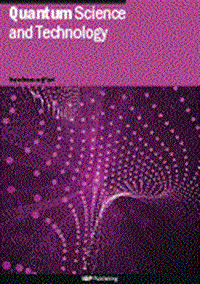通过直接多项式无约束二元优化提升量子退火性能
IF 5.6
2区 物理与天体物理
Q1 PHYSICS, MULTIDISCIPLINARY
引用次数: 0
摘要
量子退火旨在利用量子计算硬件解决实际相关的优化问题。感兴趣的问题通常是用二次无约束二进制优化(QUBO)哈密顿量来表示的。然而,许多优化问题更自然地表述为多项式无约束二元优化(PUBO)函数的高阶。正如我们通过各种问题示例所展示的那样,利用PUBO公式可以在所需的量子位数量方面节省大量费用。此外,在范式3-SAT问题的数值基准测试中,我们发现在优化扫描过程中最小能量间隙的缩放明显不同,这表明与使用QUBO公式相比,使用PUBO可能会有指数级更快的退火时间。即使考虑到PUBO成本哈密顿量所需的高阶交互所造成的开销,这种优势仍然存在。作为一个有趣的副作用,对不同3-SAT实例发生器的最小能隙的分析显示出不同的硬度,这对于经典基准计算也将是有趣的。我们的研究结果为提高模拟和数字平台上量子退火协议的资源效率和清扫速度提供了一条有希望的途径,这是解决与工业相关的更大优化问题的重要先决条件。本文章由计算机程序翻译,如有差异,请以英文原文为准。
Boosting quantum annealing performance through direct polynomial unconstrained binary optimization
Quantum annealing aims at solving optimization problems of practical relevance using quantum-computing hardware. Problems of interest are typically formulated in terms of quadratic unconstrained binary optimization (QUBO) Hamiltonians. However, many optimization problems are much more naturally formulated in terms of polynomial unconstrained binary optimization (PUBO) functions of higher order. As we show with various problem examples, leveraging the PUBO formulation can bring considerable savings in terms of required number of qubits. Moreover, in numerical benchmarks for the paradigmatic 3-SAT problem, we find scenarios where the scaling of the minimum energy gap during the optimization sweep differs significantly, suggesting the possibility of an exponentially faster annealing time when using the PUBO as compared to the QUBO formulation. This advantage persists even when considering the overhead caused by the higher-order interactions necessary for PUBO cost Hamiltonians. As an interesting side effect, the analysis on minimum energy gaps of different 3-SAT instance generators reveals different degrees of hardness, which will be of interest also for classical benchmark calculations. Our findings show a promising path to improving the resource efficiency and sweeping speed of quantum annealing protocols on both analog and digital platforms, which are important prerequisites when aiming at solving larger optimization problems with relevance to industry.
求助全文
通过发布文献求助,成功后即可免费获取论文全文。
去求助
来源期刊

Quantum Science and Technology
Materials Science-Materials Science (miscellaneous)
CiteScore
11.20
自引率
3.00%
发文量
133
期刊介绍:
Driven by advances in technology and experimental capability, the last decade has seen the emergence of quantum technology: a new praxis for controlling the quantum world. It is now possible to engineer complex, multi-component systems that merge the once distinct fields of quantum optics and condensed matter physics.
Quantum Science and Technology is a new multidisciplinary, electronic-only journal, devoted to publishing research of the highest quality and impact covering theoretical and experimental advances in the fundamental science and application of all quantum-enabled technologies.
 求助内容:
求助内容: 应助结果提醒方式:
应助结果提醒方式:


